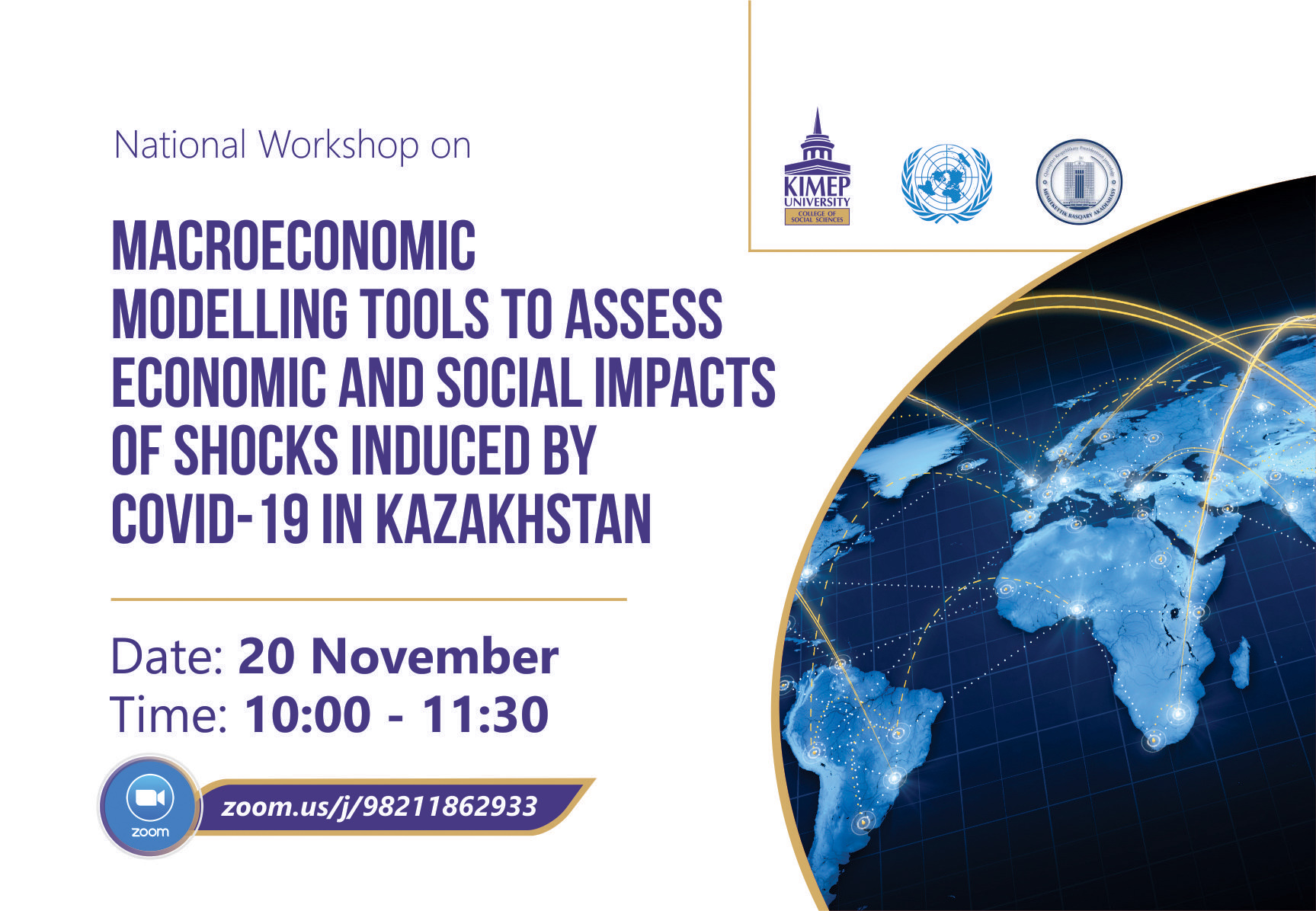UNITED NATIONS
DEPARTMENT OF ECONOMIC AND SOCIAL AFFAIRS
KIMEP University
Academy of Public Administration under the President of the Republic of Kazakhstan
Concept Note
National Workshop on “Macroeconomic modelling tools to assess economic and social impacts of shocks induced by COVID-19 in Kazakhstan”
20 November 2020
10.00-11.30
Zoom link: https: https://zoom.us/j/98211862933
Zoom link: The global COVID-19 outbreak has a broad and profound impact around the world not only on the health systems but it has also severely affected the global economy and financial markets. The rapid decline in economic activities during the first half of 2020 has been well documented and it is still unclear when economies may return back to pre-Covid growth rates and how fast the recovery may occur.
Kazakhstan reported its first confirmed COVID-19 case on 14 March, 2020. Since then, the number of confirmed cases increased significantly. A state of emergency was announced in mid-March to contain the spread of the virus. On 11 May, the state of emergency was lifted, followed by a gradual easing of quarantine measures. Quarantine measures were reinstated in early July, as the number of confirmed cases was rising. Еhe authorities again gradually eased quarantine measures on 17 August, however last week the number of confirmed cases were increasing.
Preliminary estimates of the Committee of Statistics suggest that growth rate in the first six months of 2020 were negative 1.8 per cent due to limited activities in the service sector and the oil production reduction required by the OPEC+ agreement. The Government declared a substantial anti-crisis package (9 percent of GDP) in two rounds in March, and additional supportive measures were proposed during the second quarantine. Policy actions have included some trade restrictions and regulated prices for daily necessities, cash transfers to vulnerable households, and targeted assistance to hard-hit sectors and small and medium-sized enterprises.
The Economic Analysis and Policy Division (EAPD) of the United Nations Department of Economic and Social Affairs (UN DESA) is implementing a capacity development project, “Macroeconomic modelling tools to assess economic and social impacts of shocks induced by COVID-19 in Kazakhstan”. Under the project, the expanded World Economic Forecasting Model (WEFM-e) has been tailored to country needs and has been used to simulate the impacts of the COVID-19 pandemic on a few macroeconomic and social indicators. This model opens the possibility to study the potential path of the economy based on possible policy measures and stimulus packages.
Organizers: UN DESA, KIMEP University and Academy of Public Administration under the President of the Republic of Kazakhstan.
Objective: The national policy dialogue workshop aims to bringing together experts, academia and policymakers to discuss (1) preliminary and forecasting results from UN-DESA WEFM-e on estimating the shocks of COVID-19 and their economic and social impact in Kazakhstan, (2) the cooperation between stakeholders to implement the research project by UN-DESA in Kazakhstan.
Agenda (Tentative Schedule)
| Time | Session |
| 10:00-10:10 | Welcoming remarks
Railash Turchekenova, Director of the Institute of Management of the Academy of Public Administration under the President of the Republic of Kazakhstan Dr. Gerald Pech, Dean of College of Social Sciences, KIMEP University Participants: Aizhan Arinova, Deputy Director of the Department of Macroeconomic Analysis and Forecasting of the Ministry of National Economy of the Republic of Kazakhstan Aigul Epbaeva, Deputy Director of the Department for Development of Sectors of the Economy of the Ministry of National Economy of the Republic of Kazakhstan Moderators: Dr. Raushan Dulambayeva, Academy of Public Administration under the President of the Republic of Kazakhstan Dr. Alma Kudebayeva, KIMEP University |
| 10:10-11:25 | DESA Macroeconomic Modeling Tool and Preliminary Results for Kazakhstan
Dr. Namsuk Kim, Projects Coordinator and Economic Affairs Officer UN-DESA Dr. Jaromir Hurnik, International consultant UN-DESA Open discussion |
| 11:25-11:30 | Closing |





